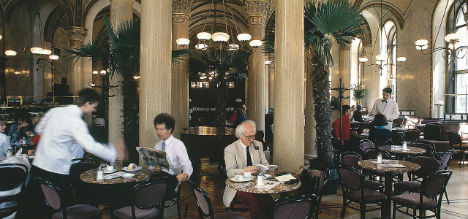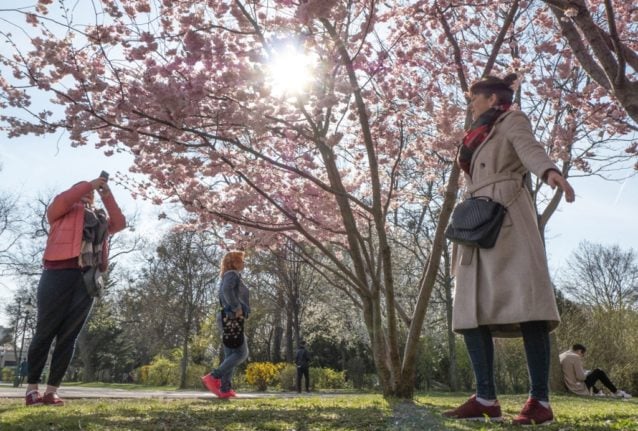Austria will no doubt bring in plenty of new laws and amendments in 2016 as it does every year, but how many will really improve our lives?
Here are the things the government could do that would please us at The Local (some of them, of course, are wishful thinking, others are more serious).
Make friendliness an obligatory requirement in the service industry
Although the service sector is a key part of Austria’s economy, many expats and tourists complain that hospitality and friendliness in some hotels and shops, restaurants and bars isn’t a given – particularly in Vienna and other larger cities. Isn’t it time that those working in the service industry learn something from customer service in the US and UK? A smile and friendly word doesn't hurt and might mean your customers return. We know that grumpy waiters are seen as an integral part of Austrian Kaffeehaus culture, but should the customer really have to win over the waiter? Last year Austria failed to make the top ten in a survey of expat destinations – because almost a third of newcomers say Austrians are unfriendly to foreigners.
Make landlords responsible for installing smoke and carbon monoxide alarms
In the UK, most private landlords are required by law to install smoke alarms and, where appropriate, carbon monoxide alarms in rental properties. In Austria that’s not the case and tenants even have to pay for their own yearly gas boiler check. New buildings in Austria now have to have smoke detectors installed – but we think it could help save lives if the government made landlords in older buildings responsible for installing smoke and carbon monoxide alarms. Just recently a teenager in Wiener Neustadt almost died after being exposed to CO from a faulty gas boiler.
Sell over the counter painkillers in supermarkets
Austrian authorities should have more sympathy for those with hangovers or head colds who can’t find a chemist open on a Sunday. Supermarkets in Austria are not allowed to sell the likes of ibuprofen or paracetamol. Plus, pharmacies tend to charge more for over the counter drugs than shops in the UK and US do, and you can’t buy generic painkillers for a fraction of the price of the bigger brands, which are available in UK supermarkets.
Scrap gender from the German language
It’s 2016, so why do we still have gender in language? The words der and die mean “the” in a masculine and feminine form. Then there is “das”, which is neutral gender. The seemingly arbitrary allocation of masculine, feminine and neutral gender articles in German can drive non-native speakers to despair. Wouldn’t it be simpler if everything was neutral gender? It also gets confusing and becomes fraught with political correctness when referring to or addressing a group of people of both gender – for example teachers. Do we go with the politically correct “LehrerInnen”, or the grammatically correct “Lehrerinnen und Lehrer” (female teachers and male teachers)? We can’t wait until the German language simplifies its gender articles, just as English has managed to do since the Middle Ages. But we fear it may take centuries.
Owners should face victims of dog poo crimes

Photo: APA
One way to tackle crime is to force criminals to meet up with their victims to learn of the trauma they have caused in the hope that they will feel remorse and mend their errant ways. Steep fines to end the problem of dog mess fouling Austria’s pavements and parks have still not had the desired effect, so maybe it’s time for a rethink.
There’s no reason why rogue dog owners shouldn’t be forced to visit the homes of their victims to hear of the suffering incurred by having to clean dog poo out of the carpet or scrape it out from the soles of their shoes.
Stub out smoking in public places
A long awaited general smoking ban for cafes and restaurants will not come into force until May 2018, meaning Austria is lagging behind the rest of Europe. Unsurprisingly, Austria has some of the worst smoking statistics in Europe and has been criticised by international organisations for its lack of anti-smoking policies. We think two years is too long to wait, and urge cafe and restaurant owners to take advantage of tax incentives and stub out smoking before the 2018 deadline – you’ll be sure of our custom.
Embrace the cashless society
Please can Austria learn to love credit and debit cards? It is 2016. Many smaller shops and independent businesses don’t take cards, and the few that do often have a minimum payment of around €10. The Western world seems to be heading towards a world without a physical currency, and it would make things much easier if Austria would get on board. How many times have you had to walk 15 or 20 minutes in the cold to withdraw cash to pay for a restaurant meal or a cup of coffee and slice of cake?
Extend shop opening hours
Very few shops are open in Austria on Sundays – except for a few supermarkets at major transport hubs. And even in the capital, Vienna, almost all supermarkets close by 6pm on Saturdays. This can make life difficult for the newly arrived expat who hasn't twigged on to the fact that you really need to do all your weekend grocery shopping on Saturday morning – and stock up if Monday happens to be a public holiday. Watch for the looks of disbelief on visiting friends' faces when you tell them that even main shops in tourist areas are closed on Sundays. We do like the idea that Sunday is a day to spend with friends and family and avoid consumerism, but please, could the supermarkets at least stay open later?



 Please whitelist us to continue reading.
Please whitelist us to continue reading.
Member comments